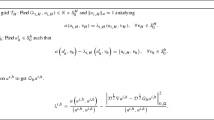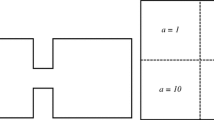Abstract
In this paper, an adaptive finite element method for elliptic eigenvalue problems is studied. Both uniform convergence and optimal complexity of the adaptive finite element eigenvalue approximation are proved. The analysis is based on a certain relationship between the finite element eigenvalue approximation and the associated finite element boundary value approximation which is also established in the paper.
Similar content being viewed by others
References
Adams R.A. (1975) Sobolev Spaces. Academic Press, New York
Arnold D.N., Mukherjee A., Pouly L. (2000) Locally adapted tetrahedral meshes using bisection. SIAM J. Sci. Comput. 22: 431–448
Babuska I., Osborn J.E. (1989) Finite element-Galerkin approximation of the eigenvalues and eigenvectors of selfadjoint problems. Math. Comp. 52: 275–297
Babuska I., Osborn J.E. (1991) Eigenvalue problems. In: Ciarlet P.G., Lions J.L.(eds) Handbook of Numerical Analysis, vol. II.. North Holland, Amsterdam, pp 641–792
Babuska I., Rheinboldt W.C. (1978) Error estimates for adaptive finite element computations. SIAM J. Numer. Anal. 15: 736–754
Babuska I., Vogelius M. (1984) Feedback and adaptive finite element solution of one-dimensional boundary value problems. Numer. Math. 44: 75–102
Bartels S., Carstensen C. (2002) Each averaging technique yields reliable a posteriori error control in FEM on unstructured grids. Part II. Higher order FEM. Math. Comp. 71: 971–994
Becker R., Rannacher R. (2001) An optimal control approach to a posteriori error estimation in finite element methods. Acta Numer. 10: 1–102
Binev P., Dahmen W., DeVore R. (2004) Adaptive finite element methods with convergence rates. Numer. Math. 97: 219–268
Carstensen C. (2005) A unifying theory of a posteriori finite element error control. Numer. Math. 100: 617–637
Carstensen C., Bartels S. (2002) Each averaging technique yields reliable a posteriori error control in FEM on unstructured grids. Part I. Low order conforming, nonconforming, and mixed FEM. Math. Comp. 71: 945–969
Carstensen C., Hoppe R.H.W. (2006) Error reduction and convergence for an adaptive mixed finite element method. Math. Comp. 75: 1033–1042
Carstensen C., Hoppe R.H.W. (2006) Convergence analysis of an adaptive nonconforming finite element method. Numer. Math. 103: 251–266
Cascon, J.M., Kreuzer, C., Nochetto, R.H., Siebert, K.G.: Quasi-optimal convergence rate for an adaptive finite element method. preprint (2007)
Chatelin F. (1983) Spectral Approximations of Linear Operators. Academic Press, New York
Chen, L., Holst, M., Xu, J.: Convergence and optimality of adaptive mixed finite element methods. Math. Comp. (to appear) (2008)
Chen Z., Nochetto R.H. (2000) Residual type a posteriori error estimates for elliptic obstacle problems. Numer. Math. 84: 527–548
Ciarlet, P.G., Lions, J.L. (eds.): Finite Element Methods, Volume II of Handbook of Numerical Analysis, vol. II. North Holland, Amsterdam (1991)
Dörfler W. (1996) A convergent adaptive algorithm for Poisson’s equation. SIAM J. Numer. Anal. 33: 1106–1124
Dörfler W., Wilderotter O. (2000) An adaptive finite element method for a linear elliptic equation with variable coefficients. ZAMM 80: 481–491
Durán R.G., Padra C., Rodríguez R. (2003) A posteriori error estimates for the finite element approximation of eigenvalue problems. Math. Mod. Meth. Appl. Sci. 13: 1219–1229
Gong X., Shen L., Zhang D., Zhou A. (2008) Finite element approximations for schrödinger equations with applications to electronic structure computations. J. Comput. Math. 26: 310–323
Greiner W. (1994) Quantum Mechanics: An Introduction, 3rd edn. Springer, Berlin
Heuveline V., Rannacher R. (2001) A posteriori error control for finite element approximations of ellipic eigenvalue problems. Adv. Comput. Math. 15: 107–138
Larson M.G. (2001) A posteriori and a priori error analysis for finite element approximations of self-adjoint elliptic eigenvalue problems. SIAM J. Numer. Anal. 38: 608–625
Lin Q., Xie G. (1981) Accelerating the finite element method in eigenvalue problems. Kexue Tongbao 26: 449–452 (in Chinese)
Mao D., Shen L., Zhou A. (2006) Adaptive finite algorithms for eigenvalue problems based on local averaging type a posteriori error estimates. Adv. Comput. Math. 25: 135–160
Maubach J. (1995) Local bisection refinement for n-simplicial grids generated by reflection. SIAM J. Sci. Comput. 16: 210–227
Mekchay K., Nochetto R.H. (2005) Convergence of adaptive finite element methods for general second order linear elliplic PDEs. SIAM J. Numer. Anal. 43: 1803–1827
Morin P., Nochetto R.H., Siebert K. (2000) Data oscillation and convergence of adaptive FEM. SIAM J. Numer. Anal. 38: 466–488
Morin P., Nochetto R.H., Siebert K. (2002) Convergence of adaptive finite element methods. SIAM Rev. 44: 631–658
Nochetto, R.H.: Adaptive finite element methods for elliptic PDE. Lecture Notes of 2006 CNA Summer School. Carnegie Mellon University, Pittsburgh (2006)
Schneider R., Xu Y., Zhou A. (2006) An analysis of discontinue Galerkin method for elliptic problems. Adv. Comput. Math. 5: 259–286
Shen L., Zhou A. (2006) A defect correction scheme for finite element eigenvalues with applications to quantum chemistry. SIAM J. Sci. Comput. 28: 321–338
Sloan I.H. (1976) Iterated Galerkin method for eigenvalue problems. SIAM J. Numer. Anal. 13: 753–760
Stevenson R. (2007) Optimality of a standard adaptive finite element method. Found. Comput. Math. 7: 245–269
Stevenson R. (2008) The completion of locally refined simplicial partitions created by bisection. Math. Comp. 77: 227–241
Traxler C.T. (1997) An algorithm for adaptive mesh refinement in n dimensions. Computing 59: 115–137
Veeser A. (2002) Convergent adaptive finite elements for the nonlinear Laplacian. Numer. Math. 92: 743–770
Verfürth R. (1996) A Riview of a Posteriori Error Estimates and Adaptive Mesh-Refinement Techniques. Wiley-Teubner, New York
Wu H., Chen Z. (2006) Uniform convergence of multigrid V-cycle on adaptively refined finite element meshes for second order elliptic problems. Sci. China Ser. A 49: 1405–1429
Xu J. (1992) Iterative methods by space decomposition and subspace correction. SIAM Rev. 34: 581–613
Xu J., Zhou A. (2000) Local and parallel finite element algorithms based on two-grid discretizations. Math. Comp. 69: 881–909
Xu J., Zhou A. (2001) A two-grid discretization scheme for eigenvalue problems. Math. Comp. 70: 17–25
Yan N., Zhou A. (2001) Gradient recovery type a posteriori error estimates for finite element approximations on irregular meshes. Comput. Methods Appl. Mech. Eng. 190: 4289–4299
Yserentant H. (2004) On the regularity of the electronic Schrödinger equation in Hilbert spaces of mixed derivatives. Numer. Math. 98: 731–759
Author information
Authors and Affiliations
Corresponding author
Additional information
This work was partially supported by the National Science Foundation of China under grant 10425105 and the National Basic Research Program under grant 2005CB321704.
Rights and permissions
About this article
Cite this article
Dai, X., Xu, J. & Zhou, A. Convergence and optimal complexity of adaptive finite element eigenvalue computations. Numer. Math. 110, 313–355 (2008). https://doi.org/10.1007/s00211-008-0169-3
Received:
Revised:
Published:
Issue Date:
DOI: https://doi.org/10.1007/s00211-008-0169-3




